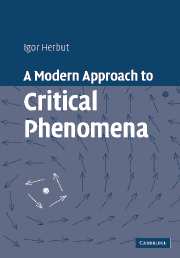Book contents
- Frontmatter
- Contents
- Preface
- 1 Introduction
- 2 Ginzburg–Landau–Wilson theory
- 3 Renormalization group
- 4 Superconducting transition
- 5 Near lower critical dimension
- 6 Kosterlitz–Thouless transition
- 7 Duality in higher dimensions
- 8 Quantum phase transitions
- Appendix A Hubbard–Stratonovich transformation
- Appendix B Linked-cluster theorem
- Appendix C Gauge fixing for long-range order
- Select bibliography
- Index
2 - Ginzburg–Landau–Wilson theory
Published online by Cambridge University Press: 06 July 2010
- Frontmatter
- Contents
- Preface
- 1 Introduction
- 2 Ginzburg–Landau–Wilson theory
- 3 Renormalization group
- 4 Superconducting transition
- 5 Near lower critical dimension
- 6 Kosterlitz–Thouless transition
- 7 Duality in higher dimensions
- 8 Quantum phase transitions
- Appendix A Hubbard–Stratonovich transformation
- Appendix B Linked-cluster theorem
- Appendix C Gauge fixing for long-range order
- Select bibliography
- Index
Summary
The partition function for interacting bosons is derived as the coherent state path integral and then generalized to magnetic transitions. Phase transitions in the Ginzburg–Landau–Wilson theory for a fluctuating order parameter are discussed in Hartree's and Landau's approximations, and the fundamental limitation of perturbation theory near the critical point is exposed. The concept of upper critical dimension is introduced.
Partition function for interacting bosons
As a prototypical system with a continuous phase transition we will consider the system of interacting bosons. A well studied physical realization is provided by helium (4He) with the pressure–temperature phase diagram as depicted in Fig. 2.1. Since the atoms of helium are light and interact via weak dipole–dipole interactions, due to quantum zero-point motion helium stays liquid down to the lowest temperatures, at not too high pressures. Instead of solidifying it suffers a continuous normal liquid–superfluid liquid transition at Tc ≈ 2K, also called the λ-transition due to the characteristic form of the specific heat in Fig. 1.6. The λ-transition represents the best quantitatively understood critical point in nature. We have already quoted the specific heat exponent α = -0.0127 ± 0.0003, with the power-law behavior being observed over six decades of the reduced temperature! To achieve this accuracy the experiment had to be performed in the space shuttle so that the small variations in Tc along the height of the sample due to Earth's gravity would be minimized. At higher pressures He eventually solidifies, with the superfluid–solid and the normal liquid–solid phase transitions being discontinuous, the former being so rather weakly.
- Type
- Chapter
- Information
- A Modern Approach to Critical Phenomena , pp. 23 - 42Publisher: Cambridge University PressPrint publication year: 2007



